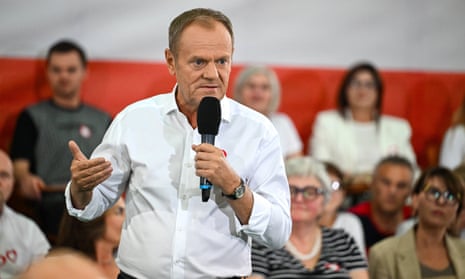“I want this message to reach everybody in Poland,” said Donald Tusk, speaking to a rally of supporters, gathered in a cavernous indoor sports arena in the city of Bydgoszcz. “This is really the last chance.”
As a vicious, bruising campaign comes to its climax ahead of parliamentary elections on 15 October, Tusk, a veteran of Polish and European politics, has sought to make this point with increasing urgency.
Polish elections: who are the key players and what is at stake?Read more
The rally was just one stop on a busy campaign trail for Tusk, whose Civic Coalition is seeking to prevent the nationalist, populist Law and Justice (PiS) government from winning a third term.
Crowds of local supporters queued to see Tusk in Bydgoszcz, and at least 2,000 packed the hall to hear him speak, waving Polish flags and applauding regularly. Tusk told them that the parliamentary vote would be a referendum – on Poland’s future as a state with democratic norms as well as on its place inside the EU.
“It will be crucial for Poland’s future, for the future of our children and grandchildren,” he said, to cheers from the loyal audience.
Tusk is perhaps Poland’s best-known politician internationally. He was prime minister between 2007 and 2014, when he left to become European Council president. A year later, his party suffered a surprise defeat in elections, with PiS coming to power.
Now, Tusk is back. He has run a slick campaign, designed to counter the stereotype that his is the party of the metropolitan elite. In Bydgoszcz, he referred to himself several times as a “normal person”, and frequently talked about his grandchildren. A campaign video shows him cheerfully boarding his campaign bus with a stack of takeaway pizza boxes to deliver to his aides. He is not a great orator, but appears very comfortable on stage and brings the gravitas of experience: he’s done the job before, after all.
His key foe in this battle is the other major figure of recent Polish politics, the PiS chair, Jarosław Kaczyński, who controls his party tightly in a largely behind-the-scenes role. PiS has used its eight years in power to try to reshape Poland, eroding democratic institutions, curtailing women’s rights and demonising migrants and minorities. It has clashed with Brussels over the rule of law, leading to tens of millions of euros of EU funds for Poland being blocked.
At the same time, the PiS government has introduced various policies that have increased welfare and social spending, winning them support among many who felt the years after the transition from communism were unfair.
Kaczyński is now fighting for another four years to continue implementing his vision for the transformation of Poland. His government has launched ferocious attacks on Tusk and his party, drawing from the populist playbook to claim the opposition represents…
2023-10-06 23:00:01
Link from www.theguardian.com
